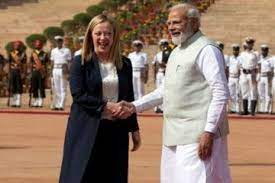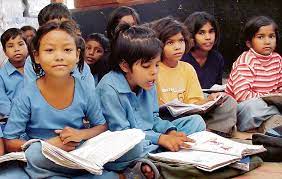Quit India Movement Day 2023:

Every year Quit India Day is observed on August 8 to commemorate the occasion. This year marks the 81st anniversary of the event.
- The Quit India Movement, also known as the August Movement or Bharat Chodo Andolan, was a significant civil disobedience movement launched by Mahatma Gandhi and the Indian National Congress on August 8, 1942 at Gowalia Tank Maidan also known as August Kranti Maidan in Bombay.
- On this day, August 8th, in 1942, Gandhi gave the famous “Do or Die” speech, urging the Indian people to act decisively and nonviolently against British rule.
- While factors leading to such a movement had been building up, matters came to a head with the failure of the Cripps
- The failure of the Cripps Mission made Gandhi realise that freedom would come only if Indians fought tooth and nail for it.
- The movement aimed to demand an end to British colonial rule in India and achieve full independence.
- The movement saw widespread protests, strikes and acts of civil disobedience across the country.
- People participated in marches, demonstrations, and various forms of nonviolent resistance.
- Women played a vital role in the Quit India Movement, displaying immense courage and leadership.
Raisina Dialogue : Global Level Think Tank

Foreign Secretary recently told a Parliament committee that the Raisina Dialogue is now among the most significant global level think tank events in the world.
- Raisina Dialogue is India’s premier conference on geopolitics and geoeconomics, committed to addressing the most challenging issues facing the global community.
- It is modeled on the lines of the Munich Security Conference and Singapore’s Shangri-La Dialogue.
- It is held annually since 2016 in New Delhi.
- The Dialogue is structured as a multi-stakeholder, cross-sectoral discussion involving heads of state, cabinet ministers, and local government officials, who are joined by thought leaders from the private sector, media, and academia.
- It is organized by the Observer Research Foundation (ORF) in partnership with the Ministry of External Affairs, Government of India.
- Observer Research Foundation (ORF) established in 1990, the ORF is an independent, nonpartisan think tank that conducts policy research on good governance, foreign policy, and sustainable economic development for India.
- ORF’s work spans a wide range of topics, including climate, energy, cyber issues and media, economic development, and national security.
- It provides non-partisan, independent, well-researched analyses and inputs to diverse decision-makers in governments, business communities, academia, and to civil society around the world.
- It seeks to lead and aid policy thinking towards building a strong and prosperous India in a fair and equitable world.
Maya Operating System:

The Defence Ministry recently decided to drop the Microsoft operating system and go for a local one named Maya operating system.
- Maya OS is a new Operation System (OS) based on an open-source platform.
- It has the interface and all functionality like Windows and users will not feel much difference as they transition to it.
- Maya was developed by government development agencies within six months.
- Aim is to prevent malware attacks and other cyberattacks which had seen a steep increase.
- Currently, Maya is being installed only in Defence Ministry systems and not on computers connected to the networks of the three Services.
- Operating System (OS)is a software program that acts as an intermediary between computer hardware and the computer user.
- It provides a user-friendly interface and manages the hardware and software resources of a computer system.
- In essence, an operating system enables a user to interact with a computer and run applications efficiently.
- An OS, after being initially loaded into the computer by a boot program, manages all of the other application programs in a computer.
North East Venture Fund:

The Union Minister for Ministry of Development of North Eastern Region informed Lok Sabha about the North East Venture Fund.
- North East Venture Fund is registered as a Category I Venture Capital Fund under Securities and Exchange Board of India (SEBI) Alternative Investment Funds (AIF) Regulations, 2012.
- An independent committee (Investment Committee) comprising of experienced professionals from the field of venture funding, private equity, developmental banking etc takes the investment decision.
- As a regulatory requirement, periodic reporting on the operation/compliances of regulation is placed before the contributors of NEVF and other concerned bodies in a structured manner.
- In addition, fund operation is also monitored by Reserve Bank of India (RBI) and Comptroller and Auditor General of India (CAG) in the form of periodic audit.
- It was established as a close ended fund with a target corpus of Rs. 100 crore.
- It has already received its targeted corpus with contribution of Rs. 30 crore from North Eastern Development Finance Corporation Ltd. (NEDFi), Rs. 25 crore from Small Industries Development Bank of India (SIDBI) and Rs. 45 crore from Ministry of Development of North Eastern Region (MDoNER).
- However, the contribution of MDoNER was given to NEDFi as interest free loan to be repayable in lump sum at the end of 15 years.
Direct Incentive Disbursement : Postal Life Insurance

Recognising the pivotal role of its sales force, the Postal Life Insurance (PLI) introduced the pilot program for “Direct Incentive Disbursement” in the Delhi and Uttarakhand Circles.
- Direct Incentive Disbursement Program will recognize the role of PLI’s sales force which is the driving force behind the department’s accomplishments.
- It will impact around two lakh sales force members across the nation, including Gramin Dak Sevaks, Direct Agents, Field Officers, and Departmental Employees.
- Sales force receives incentives directly in their Post Office Savings Bank accounts.
- Sales force can conveniently manage their funds, and immediate rewards drive optimal performance.
- Automated payouts reduce administrative costs, enabling a greater focus on delivering client service.
Postal Life Insurance:
- It is the oldest life insurer in this country which was introduced on 1st February 1884.
- It started as a welfare scheme for the benefit of postal employees and was later extended to the employees of the Telegraph Department in 1888.
ECOWAS:

Member countries of Economic Community of West African States (ECOWAS) will meet to discuss their next steps, after Niger’s military junta defied their deadline to reinstate the country’s ousted president.
- ECOWAS is the West African nation’s regional group which was established in 1975 through the Lagos Treaty.
- Aim is to have a single common currency and create a single, large trading bloc in areas of industry, transport, telecommunications, energy, financial issues, and social and cultural matters.
- Member countries: Benin, Burkina Faso, Cape Verde, Cote d’ Ivoire, The Gambia, Ghana, Guinea, Guinea Bissau, Liberia, Mali, Niger, Nigeria, Sierra Leone, Senegal and Togo. Around 400 million people live in this region.
- These countries have both cultural and geopolitical ties and shared common economic interest.
- Headquarters: Abuja, Nigeria.
- Beyond the goals of economic cooperation, ECOWAS has attempted to quell military conflicts in the region.
- ECOWAS also operated a regional peacekeeping operation known as ECOMOG, led by Nigeria in the 1990s and early 2000s.
State Of Elementary Education In Rural India 2023:

The Ministry of Education has released the State of Elementary Education in Rural India – 2023 report, highlighting the Prevalence of Smartphone Usage among students.
- The report was based on a survey conducted by the Development Intelligence Unit (DIU), a collaboration between NGO Transform Rural India and Sambodhi Research and Communications.
- The survey gathered responses from 6,229 parents of schoolchildren aged 6–16 in rural communities across 21 States.
Key Findings of the Survey:
- 49.3% have access to smartphones. 76.7% of parents indicated that their children primarily use smartphones for playing video games, indicating a preference for entertainment over educational activities.
- Additionally, 56.6% of students use smartphones to download and watch movies, while 47.3% use them to download and listen to music.
- In contrast, only 34% of students use smartphones for study-related downloads, and a mere 18% access online learning via tutorials.
- Smartphone access varies across different class levels.
- Students in higher classes (Class VIII and above) have greater access to smartphones (58.32%), while even younger students (Classes I–III) show considerable access (42.1%).
- This indicates that smartphone usage for entertainment is prevalent across age groups, potentially impacting their educational engagement.
- 78% of parents aspire for their children to attain graduation-level education or above, however, there is a gap in parental engagement.
- Only 40% of parents have daily conversations with their children about their school learning, while 32% engage in such conversations a few days a week.
- For girls, 36.8% of parents mentioned that the need to contribute to family earnings led to their daughters dropping out.
- Meanwhile, 31.6% attributed the dropout to their child’s lack of interest in studies, and 21.1% believed household responsibilities played a role.
- For boys, the primary reason for dropping out was a lack of interest in studies, cited by 71.8% of respondents, followed by 48.7% stating the need for boys to contribute to family earnings.
- 84% of parents reported regular attendance.
- Additionally, the availability of age-appropriate reading materials other than textbooks was reported by 40% of parents, highlighting the need for further resources to support children’s learning at home.
Rhesus Macaques : Recent Study

A recent study conducted by researchers from Imperial College London, titled “Genetics, Social Environment and Evolution of Male Same-Sex Behavior in Rhesus Macaques,” has challenged conventional beliefs about same-sex behaviour (SSB) in animals.
- The engagement of animals in SSB has been considered a ‘Darwinian paradox’: if reproduction is critical to evolution, then SSB – which is non-reproductive – should have ceased to exist.
- This recent study found that male SSB in rhesus macaques is very common and doesn’t harm evolution.
Key Findings from the Study:
- The study focuses on male same-sex mounting behaviour observed in rhesus macaques, a common monkey model, in Cayo Santiago, an island east of Puerto Rico.
- 72% of observed male rhesus macaques engaged in same-sex mounting.
- Only 46% participated in different-sex mounting.
- It challenges the notion that SSB contradicts principles of evolution due to its non-reproductive nature.
- The study considers external factors like social interactions and the environment.
- These non-genetic elements contribute to the expression of SSB behaviour in male rhesus macaques.
- SSB-engaging monkeys form coalitions against common enemies.
- Male SSB could serve as a form of emotional communication and regulation.
- The study disputes the assumption that SSB reduces reproductive opportunities, as sexually active males engage in both SSB and different-sex sexual behaviour (DSB).
- There is no direct correlation between SSB engagement and reduced offspring count in the macaque population.
31st World University Games:

The 31st World University Game was held in Chengdu, China, where India has won a total of 26 medals across 4 disciplines with highest medal count at the World University Games.
- Many of the athletes who won the Medals come from Khelo India Scheme and Target Olympic Podium Scheme (TOPS).
- It had to be held in 2021, the World University Games had to be rescheduled twice due to the Covid-19 pandemic.
- World University Game also known as “Universiade,” is an international multi-sport event specifically for university athletes.
- It is organized by the International University Sports Federation (FISU).
- FISU is the governing body that oversees and organizes the Universiade events.
- FISU is responsible for coordinating the host cities and ensuring that the games are conducted in accordance with the organization’s principles and regulations.
- The Universiade is held every two years and features a wide range of sports similar to the Olympic Games.
- It includes both summer and winter editions,
- With the summer Universiade typically featuring sports like athletics, swimming, basketball, soccer, and more,
- While the winter Universiade includes sports like skiing, ice hockey, figure skating, and others.
World Tribal Day 2023:

The International Day of the World’s Indigenous Peoples, also known as World Tribal Day, is observed annually on August 9, as per a resolution by the UN General Assembly in December 1994.
- This date commemorates the inaugural meeting of the UN Sub-Commission on the Promotion and Protection of Human Rights Working Group on Indigenous Populations in 1982, highlighting its significance in promoting and safeguarding the rights of indigenous populations worldwide.
- The theme of World Tribal Day in 2023 is “Indigenous Youth as Agents of Change for Self-determination.”
- The day is necessary since indigenous peoples are frequently among the most underprivileged racial and ethnic groupings in society.
- The UN estimates that although indigenous people make up less than 5% of the global population, they are responsible for 15% of the world’s poorest people.
Indian Air Force Received Israel’s Anti Guided Missiles:

The Indian Air Force has received Israel’s Spike Non-Line of Sight (NLOS) anti-tank guided missiles.
- The Spike NLOS will be integrated with the Russian-origin fleet of Mi-17V5 helicopters.
- Spike Non-Line of Sight (NLOS) developed by: Rafael Advanced Defense Systems Ltd, Israel.
- Spike NLOS is a multi-purpose, electro-optical/infrared missile system.
- It is a fire-and-forget anti-tank and anti-personnel missile.
- Range: up to 32 kilometers
- It can be integrated with the ground, air, or maritime platforms.
- It has the capability to strike distant or geographically concealed targets without line-of-sight.
- In missile guidance, line of sight (LOS) is the line directly between the launcher/tacker and the target.
- The weapon’s seeker and wireless datalink provide operators with real-time video imagery and man-in-the-loop control throughout the missile’s flight.
- This provides operators with the opportunity to alter or abort the mission while en route to the target.
- The made-in-Israel Spike missile is capable of destroying enemy targets hidden behind mountains from long ranges.
Project Devika : North India’s First River Rejuvenation

It was announced that North India’s first River Rejuvenation Project Devika is nearing its completion.
- It was Built at a cost of over Rs 190 crore on the lines of ‘Namami Ganga’, the Project was launched by Prime Minister Shri Narendra Modi
- Project Devika launched in 2019.
- It was launched under the National River Conservation Plan (NRCP).
- Ministry: Ministry of Jal Shakti.
- Project Devika aims to rejuvenate the Devika River.
- Under the project, bathing “ghats” (places) on the banks of the Devika River will be developed.
- Further, the encroachments will be removed, and natural water bodies will be restored.
- The catchment areas will also be developed along with cremation grounds.
- The Liquid Waste Management Project involves creating a network of pipes and manholes connecting households under the Project. (Cleaning of River Ganga)
- A Solid Waste Management Project is additionally planned to further enhance the river’s restoration.
- The project also includes the construction of three sewage treatment plants, the development of two cremation ghats, protection fencing and landscaping, small hydropower plants, and three solar power plants.
- Devika River originates from the hilly Suddha Mahadev temple in the Udhampur district of Jammu and Kashmir and flows down towards western Punjab (now in Pakistan) where it merges with the Ravi River.
- The river holds religious significance as it is revered by Hindus, as the sister of the river Ganga.
- It is believed that Devika River is a manifestation of the Goddess Parwati.